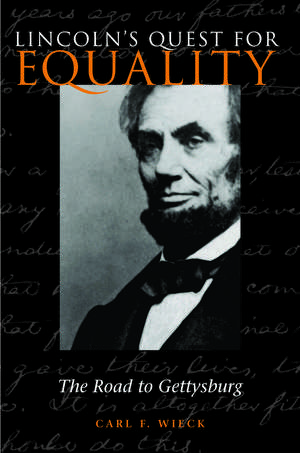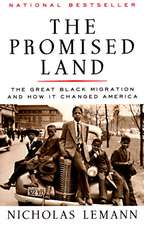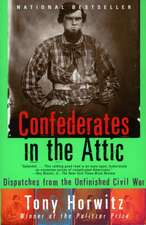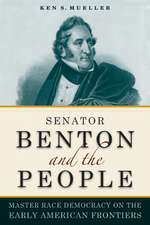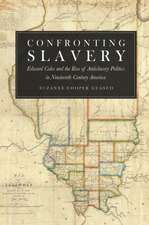Lincoln's Quest for Equality: The Road to Gettysburg
Autor Carl F. Wiecken Limba Engleză Hardback – 9 sep 2002
The "House Divided" speech helped to win Lincoln the presidency; the Gettysburg Address made him an icon. How did Lincoln come to speak the words that would change a nation? Analyzing the ideas and rhetoric in these two crucial speeches, Carl F. Wieck argues that the radical abolitionist movement exerted a significant influence on Lincoln's thought and moral development.
One of the most famous phrases in the Gettysburg Address—"government of the people, by the people, for the people"—was previously associated with Unitarian minister and radical abolitionist Theodore Parker, and Wieck argues that Lincoln's debt to Parker extends far beyond borrowing these few words. Establishing a clear connection between Lincoln and Parker through their mutual friend and Lincoln's law partner, William Herndon, Wieck traces the similarities between Lincoln's key speeches and the philosophy, rhetoric, logic, and ideas found in writings by Parker and other abolitionists.
Ever the cautious politician, Lincoln sought to hide his intellectual and personal connections to the maligned and unpopular abolitionists. The usefulness of such subterfuge became apparent when, after John Brown's attempt to incite a slave revolt, Lincoln could truthfully state that he had no direct contact with radical abolitionists. In the meantime, Lincoln not only drew from Parker's abolitionist propaganda but also was influenced by Daniel Webster, a fervent nationalist who had advocated compromise over slavery in order to preserve the Union. Combining these seemingly contradictory political traditions, Lincoln created a contested middle position that ultimately brought him to the White House.
Tracing the Great Emancipator's political ideology from the antebellum era and culminating at Gettysburg, Lincoln's Quest for Equality sheds new light on the intellectual development of the president who reshaped American political culture.
One of the most famous phrases in the Gettysburg Address—"government of the people, by the people, for the people"—was previously associated with Unitarian minister and radical abolitionist Theodore Parker, and Wieck argues that Lincoln's debt to Parker extends far beyond borrowing these few words. Establishing a clear connection between Lincoln and Parker through their mutual friend and Lincoln's law partner, William Herndon, Wieck traces the similarities between Lincoln's key speeches and the philosophy, rhetoric, logic, and ideas found in writings by Parker and other abolitionists.
Ever the cautious politician, Lincoln sought to hide his intellectual and personal connections to the maligned and unpopular abolitionists. The usefulness of such subterfuge became apparent when, after John Brown's attempt to incite a slave revolt, Lincoln could truthfully state that he had no direct contact with radical abolitionists. In the meantime, Lincoln not only drew from Parker's abolitionist propaganda but also was influenced by Daniel Webster, a fervent nationalist who had advocated compromise over slavery in order to preserve the Union. Combining these seemingly contradictory political traditions, Lincoln created a contested middle position that ultimately brought him to the White House.
Tracing the Great Emancipator's political ideology from the antebellum era and culminating at Gettysburg, Lincoln's Quest for Equality sheds new light on the intellectual development of the president who reshaped American political culture.
Preț: 347.25 lei
Nou
Puncte Express: 521
Preț estimativ în valută:
66.45€ • 72.16$ • 55.82£
66.45€ • 72.16$ • 55.82£
Carte tipărită la comandă
Livrare economică 23 aprilie-07 mai
Preluare comenzi: 021 569.72.76
Specificații
ISBN-13: 9780875802992
ISBN-10: 0875802990
Pagini: 224
Dimensiuni: 140 x 216 x 23 mm
Greutate: 0.42 kg
Ediția:1
Editura: Northern Illinois University Press
Colecția Northern Illinois University Press
ISBN-10: 0875802990
Pagini: 224
Dimensiuni: 140 x 216 x 23 mm
Greutate: 0.42 kg
Ediția:1
Editura: Northern Illinois University Press
Colecția Northern Illinois University Press
Recenzii
"Subtle, sophisticated, and persuasive."—Michael Burlingame, Connecticut College
"Expertly written and tightly argued."—Choice
"A well-written and intriguing narrative."—Civil War News
"Expertly written and tightly argued."—Choice
"A well-written and intriguing narrative."—Civil War News
Notă biografică
Carl F. Wieck is Senior Lecturer in English at Tampere University, Finland, and the author of Refiguring Huckleberry Finn.
Cuprins
Table of Contents
Acknowledgments
Introduction
1. Lincoln, Parker, and Abolitionism
2. Concealing Lincoln's Abolitionism
3. Parker and Politicians
4. Lincoln's "House Divided" Revisited
5. What Lincoln Took to Gettysburg
6. The Gettysburg Phrase
Conclusion
Notes
Bibliography
Index
Introduction
1. Lincoln, Parker, and Abolitionism
2. Concealing Lincoln's Abolitionism
3. Parker and Politicians
4. Lincoln's "House Divided" Revisited
5. What Lincoln Took to Gettysburg
6. The Gettysburg Phrase
Conclusion
Notes
Bibliography
Index
Descriere
The "House Divided" speech helped to win Lincoln the presidency; the Gettysburg Address made him an icon. How did Lincoln come to speak the words that would change a nation? Analyzing the ideas and rhetoric in these two crucial speeches, Carl F. Wieck argues that the radical abolitionist movement exerted a significant influence on Lincoln's thought and moral development.
One of the most famous phrases in the Gettysburg Address—"government of the people, by the people, for the people"—was previously associated with Unitarian minister and radical abolitionist Theodore Parker, and Wieck argues that Lincoln's debt to Parker extends far beyond borrowing these few words. Establishing a clear connection between Lincoln and Parker through their mutual friend and Lincoln's law partner, William Herndon, Wieck traces the similarities between Lincoln's key speeches and the philosophy, rhetoric, logic, and ideas found in writings by Parker and other abolitionists.
Ever the cautious politician, Lincoln sought to hide his intellectual and personal connections to the maligned and unpopular abolitionists. The usefulness of such subterfuge became apparent when, after John Brown's attempt to incite a slave revolt, Lincoln could truthfully state that he had no direct contact with radical abolitionists. In the meantime, Lincoln not only drew from Parker's abolitionist propaganda but also was influenced by Daniel Webster, a fervent nationalist who had advocated compromise over slavery in order to preserve the Union. Combining these seemingly contradictory political traditions, Lincoln created a contested middle position that ultimately brought him to the White House.
Tracing the Great Emancipator's political ideology from the antebellum era and culminating at Gettysburg, Lincoln's Quest for Equality sheds new light on the intellectual development of the president who reshaped American political culture.
One of the most famous phrases in the Gettysburg Address—"government of the people, by the people, for the people"—was previously associated with Unitarian minister and radical abolitionist Theodore Parker, and Wieck argues that Lincoln's debt to Parker extends far beyond borrowing these few words. Establishing a clear connection between Lincoln and Parker through their mutual friend and Lincoln's law partner, William Herndon, Wieck traces the similarities between Lincoln's key speeches and the philosophy, rhetoric, logic, and ideas found in writings by Parker and other abolitionists.
Ever the cautious politician, Lincoln sought to hide his intellectual and personal connections to the maligned and unpopular abolitionists. The usefulness of such subterfuge became apparent when, after John Brown's attempt to incite a slave revolt, Lincoln could truthfully state that he had no direct contact with radical abolitionists. In the meantime, Lincoln not only drew from Parker's abolitionist propaganda but also was influenced by Daniel Webster, a fervent nationalist who had advocated compromise over slavery in order to preserve the Union. Combining these seemingly contradictory political traditions, Lincoln created a contested middle position that ultimately brought him to the White House.
Tracing the Great Emancipator's political ideology from the antebellum era and culminating at Gettysburg, Lincoln's Quest for Equality sheds new light on the intellectual development of the president who reshaped American political culture.
